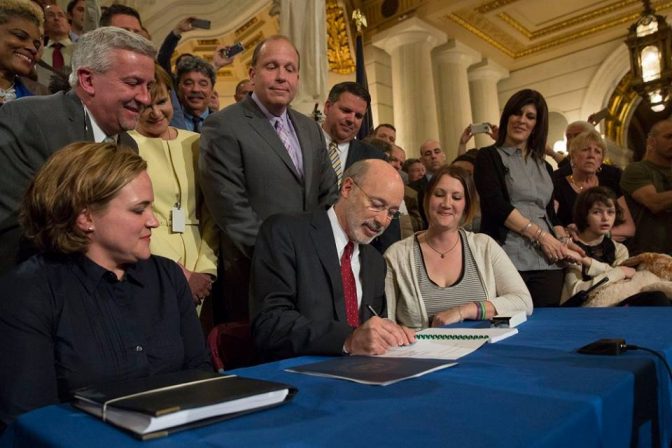Pennsylvania Medical Cannabis: How Good Bills Go Bad

Photos courtesy of Pa. Governor Tom Wolf’s Facebook page. Above: Lolly Bentch Myers (left), Gov. Tom Wolf (center) and Dana Ulrich (right).
The new oil-only medical cannabis law in Pennsylvania is a prime example of a stark evolution in compassionate use legislation. Exclusive operating contracts and a heavily restricted range of products are the hallmark of this new model.
Gone are the days of creating robust programs with strong participation and local innovation. Instead, the recent laws are made to reach only a handful of seriously ill residents. Many patients, desperate for reform, are forced into these limited options and told the alternative is nothing at all. Not surprisingly, there’s still a major financial boon built in for a limited, state-authorized, cartel.
On April 17, Pennsylvania Governor Tom Wolf signed the law with nothing but the best of intentions. The long time supporter was surrounded by a crowd of elected officials, parents, children, advocates, and many potential patients.
Wolf, a Democrat, had spent months in a bitter budget deadlock with the state legislature’s GOP Majority. But the partisan battles were set aside as some House Republicans gave passionate speeches to support the medical cannabis bill’s final passage.
“I was diagnosed with renal carcinoma 4,056 days ago,” said Rep. Jeff Pyle, choking up with emotion. Pyle explained how a friend offered him cannabis oil, but he refused to take it because he didn’t want to break the law. Pyle voted yes on the bill.
A month later and the Democrats and Republicans were standing together beaming as. Gov. Wolf put pen to paper. Cameras clicked, video rolled and ink was printed by the gallon.
Severely ill patients, even vets with PTSD, would now have access to cannabis. A wonderful new industry would sprout. Advocacy groups updated maps and victoriously checked Pennsylvania off their list. At least those were the headlines.
Patients are not so thrilled. Whole-plant cannabis is still off limits and smoking flowers is still prohibited, and that doesn’t feel right.
Why are only extracts allowed?
“The conventional understanding is that drugs come in pill form,” said says Paul Armentano, Deputy Director of NORML. “Therefore, other alternative delivery methods don’t fit neatly into this narrowly defined box that politicians are familiar with.”
New York, Pennsylvania, Louisiana and now Ohio have very similar laws, and it’s no accident. This playbook offers politicians a mountain of positive press, along with a connection to a wide swath of voters who support the cause.
“They want the opportunity to tell their constituents that they addressed the medical marijuana issue,” says Armentano, while pointing out, “It appears that politicians tend to be vying to say publicly that theirs is the most restrictive [medical marijuana] law in the country.”
Meanwhile, successful cannabis operators in Colorado and elsewhere have spent time and money to influence the outcome of the NY/PA/OH oil-only laws. It paid off in language that generously specifies that out-of-state businesses can win licenses.
In Pennsylvania, those license certifications are transferable. Other states required operators to be non-profit entities. Unused licenses under many state regs are forfeited or, in practice, simply remain dormant. Suddenly these pieces of paper have value on their own.
Caught in the middle of this money and intense hardball politics is a group of sincere citizen activists: Parents of children who need cannabis therapy.
You have seen them on television and in your local newspaper those awesome kids who endure seizure conditions and other rare diseases, and markedly benefit from medical marijuana. Some need cannabis therapy to, quite literally, survive.
Most of these families had have never even gone to a governmental meeting. Now they are thrust by necessity into state houses, and must become professional effective political operators overnight. The scope of their advocacy has often widened far beyond their front lawn, as they work to represent all patients of all ages.
Latrisha “Lolly” Bentch Myers is a medical cannabis mom in Pennsylvania. Her 7-year- old daughter Anna was initially diagnosed with autism. But the real condition later became clear: mesial temporal sclerosis, which causes cognitive delays, sleep disorders, anxiety, and intractable epilepsy.
Myers lives minutes from the Pennsylvania State Capitol in Harrisburg. In 2013, she began working with PA Campaign for Compassion, her first foray into politics.
Navigating the legislative process was a big hurdle, “I don’t know what the rules are, and it feels like they make up the rules as they go,” Myers says of the seemingly endless delays.
Indeed, how a bill becomes a law is far more complicated than School House Rock. In some ways medical marijuana is almost too successful: Bills that are sure to pass quickly become a hot trading commodity in the open marketplace of political favors.
“There’s all sort of ways you can pull strings and get things done,” said Myers after seeing people working the game.
Changing local marijuana laws is a largely volunteer enterprise. For states without the ballot initiative process, the issue must be won through pure politics. That means un-paid activists make time to coordinate meetings with every single members of relevant governing bodies and committees.
Myers says a good first impression gave her the momentum to move forward. “The first time I walked into the capitol, I went in for a meeting with Senator Rob Teplitz, and it went exactly the way I thought it would,” she recalls. “Taking him amazing information, telling him about my daughter, telling him he needs to help. He sponsored the bill that afternoon.”
That was an unusually positive meeting. Dana Ulrich is another Pennsylvania mom, whose daughter Lorelei lives with a severe seizure condition. She lives about two hours from Harrisburg. Despite the long drive, Ulrich got the more standard response.
“These legislators would see moms coming in begging for their children. We thought they would be falling all over themselves to pass legislation,” says Ulrich. “I was wrong.”
The moms dug in and logged thousands of miles on the asphalt ribbon of the PA Turnpike. “I thought that it would be a lot easier than it was,” she says. But they were making progress.
In 2013 some real champions for the bill emerged, including State Senator Mike Folmer, a Republican from rural Lebanon Township. Folmer would spend the next three years shepherding the bill all the way to Gov. Wolf.
The parents immediately faced some critical choices in the fall of 2013. The politicians offered the them a quick fix in the form of a CBD-only bill that would only apply to children. It was an attractive prospect, but they refused.
The parents used their new influence and asked for something better. SB1182 was introduced instead, a bill that covered adult patients with no restrictions on THC, and allowed smoking, home cultivation and an open industry.
A year of committee hearings saw dramatic changes to the bill. By 2014, many qualifying conditions were deleted, even HIV/AIDS, and smoking was eliminated as a delivery option for the first time in the language. The Pennsylvania Senate went on to pass this version.
Elected officials and cynical lobbyists shrugged. Words that have a dangerous double meaning in politics were spoken with conviction; words like “compromise” that can sound so sweetly diplomatic, but really mean that a bill has been gutted.
When the medical cannabis bill reached the Pennsylvania House in 2015, the Republicans in the majority leadership formed a working group to study it… for six months. After several delays came another extensive re-write: The House version raised taxes, put limits on products, inserted caps on THC content of 10% for any product and inserted rules favoring an exclusive industry.
Confronted with a slew of bad provisions, the advocates only had time to argue a few of the biggest problems away. They removed restrictions on THC content (again) and successfully expanded the list of qualifying conditions winning HIV a place on the final list.
“What we went in there asking for is not what we ended up getting,” said says Dana Ulrich.
It was time for a compromise. Myers describes her first dose of the process, “I have been deeply disturbed by what I have witnessed in the last three years. There are a lot of genuinely kind and compassionate legislators in Pennsylvania who want to do right, but there’’s more of them that are safe in their seats.”
Still, the two remain hopeful. Now, with years of experience, these women have gained a unique skill set. After getting elbow-deep in the grime of politics, they have both arrived at a potential solution: run for office.
“I would run to be in Harrisburg, to be in the state house,” says Ulrich, “There are too many lifelong politicians who are way to comfortable in their cushy office chairs. There needs to be a change. I’’d like to be the one to try.”
“Yes. I would run for state office,” Myers concurs. “I can compromise and think outside the box.”
Having people like Dana Ulrich and Lolly Myers within the government may be the only answer to get states back on a better track regarding medical cannabis.
“We can’t vote them out because nobody ever runs,” says Myers.
She’s on to something: Transforming advocates into the very elected officials who make these critical decisions is clearly the next path for the cannabis reform movement.
UPDATE – On June 29, State Senator Mike Folmer announced that Dana Ulrich was appointed to the Medical Cannabis Advisory Board for Pennsylvania.

Dana Ulrich on April 17, 2016 at the Pa Capitol signing of the medical marijuana law.
If you enjoyed this Freedom Leaf article, consider subscribing today!

